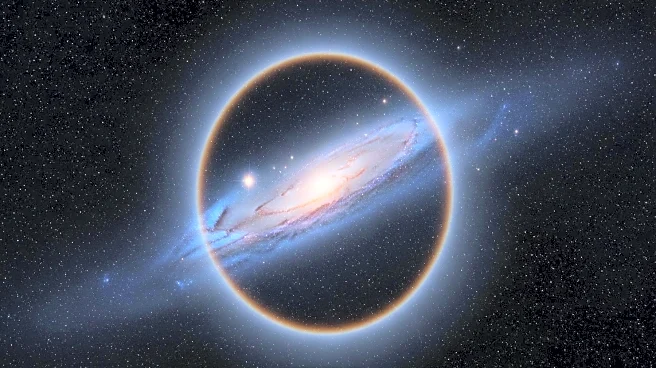What's Happening?
Astronomers have identified a massive dark matter object, reportedly a million times larger than the sun, located over 10 billion light-years away. This discovery was made using gravitational lensing, a method where the gravity of a dark entity distorts the light of a more distant object. The research team, led by John McKean from the University of Groningen, utilized a global network of telescopes, including the Green Bank Telescope in West Virginia and the Very Long Baseline Array in Hawaii, to create an 'Earth-sized super telescope.' This enabled them to detect subtle signs of gravitational lensing, revealing the presence of the dark matter object. The findings expand our understanding of dark matter, which is believed to exist without emitting visible light.
Why It's Important?
The discovery of this dark matter object is significant as it challenges existing theories about the universe's composition and the formation of galaxies. Dark matter is a crucial component of the universe, yet remains largely mysterious due to its invisibility. Understanding its properties and distribution can provide insights into cosmic evolution and the behavior of galaxies. This research could lead to advancements in astrophysics and potentially redefine models of galaxy formation. The ability to detect such objects also demonstrates the effectiveness of gravitational lensing as a tool for exploring the universe's unseen components.
What's Next?
Researchers aim to find more dark matter clumps to test and refine their understanding of galaxy formation. The discovery prompts further investigation into the nature of dark matter and its role in the universe. Future studies may focus on identifying additional dark matter objects and analyzing their impact on cosmic structures. Continued advancements in telescope technology and computational algorithms will be essential for these explorations.
Beyond the Headlines
The detection of dark matter clumps could have implications for understanding the universe's origins, potentially predating the Big Bang. This research may also influence the search for extraterrestrial life by altering perceptions of habitable zones and cosmic environments. Ethical considerations arise regarding the allocation of resources for space exploration versus addressing terrestrial challenges.










